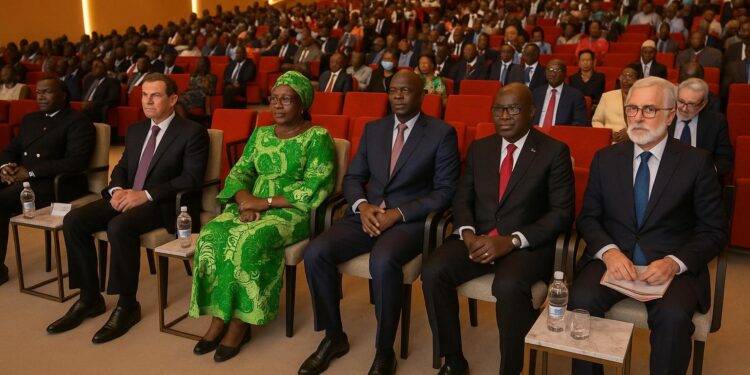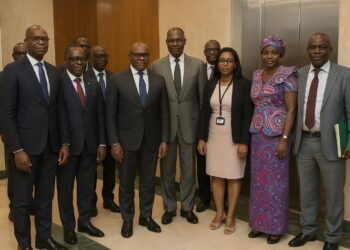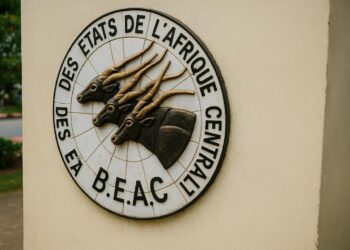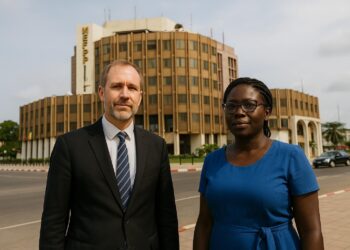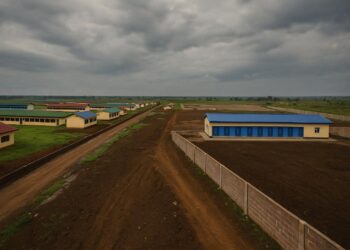Brazzaville Hosts 8th International Tax Colloquium
In a packed auditorium overlooking the Congo River, Agriculture, Livestock and Fisheries Minister Paul Valentin Ngobo opened the eighth International Tax Colloquium on 9 September, calling on fiscal experts to engage in “constructive, future-oriented exchanges” that will shape an equitable and durable tax system for all key stakeholders.
The three-day event, staged in Brazzaville under the theme “Role and Place of National Tax Law: Mobilising Revenue and Ensuring Sustainability”, has drawn senior officials, academics, accountants and business leaders from across Central Africa, as well as observers from the African Tax Administration Forum and the IMF.
Fiscal Policy as Engine of Sustainable Growth
Ngobo reminded delegates that taxation is not merely a legal obligation; it is a key lever for financing economies, reviving growth and promoting inclusive development, especially at a time when oil-dependent budgets are exposed to volatile commodity cycles and tightening global credit conditions across the region.
He urged participants to craft recommendations capable of boosting administrative performance and strengthening trust between the state and businesses, echoing recent World Bank findings that predict a two-point rise in non-oil revenue if compliance costs are reduced and dispute resolution accelerated significantly nationwide.
Digital Tools Reshape Revenue Administration
Director-General of Taxes and Estates Ludovic Itoua took the floor next, describing taxation as a governance tool that mirrors transparency, predictability and equity, and outlining reforms in value-added tax, digital filing and a simplified forfait system for micro-entrepreneurs, launched this year to widen the base.
According to Itoua, e-payments are already covering 70 percent of large-taxpayer declarations, cutting processing times from weeks to days; the administration now targets real-time data analytics by 2025, in line with benchmarks set by Rwanda and Côte d’Ivoire and wider interoperability across the board.
SME-Friendly Measures Broaden the Tax Net
Small and medium-sized enterprises, which account for nearly 90 percent of formal jobs in Congo-Brazzaville, remain under-represented in the tax registry, yet studies by the Economic Commission for Africa show they could add one percent of GDP in receipts if compliance is simplified and incentives improved.
The forfait initiative therefore caps annual tax bills for traders under a clear threshold, gives them a QR-coded certificate that banks already recognise, and is expected to ease their access to credit while reducing unpaid balances that previously strained municipal budgets nationwide significantly too.
Harnessing Natural Resources Responsibly
Another recurring theme is the optimal use of revenue from hydrocarbons, timber and minerals, which still supply over 60 percent of state income; panellists argued that well-designed royalty and profit-sharing formulas can protect competitiveness while securing funds for climate adaptation programmes locally and regionally as well.
Congo’s recent decision to join the Extractive Industries Transparency Initiative, which is undergoing domestic ratification, was widely welcomed as a step that could improve reporting on production volumes and transfer pricing without deterring investors already operating under production-sharing agreements in the oil corridor offshore blocks.
Regional Cooperation and Global Standards
Speakers from the African Union’s Commission on Economic Affairs emphasised that Congo-Brazzaville’s reforms dovetail with continental efforts to curb base-erosion and profit-shifting, noting that 33 African countries have now signed the OECD’s Pillar Two framework for a 15 percent global minimum tax threshold by 2024 implementation deadline.
Closer collaboration with the Bank of Central African States is also under discussion so that customs revenue, carbon credits and digital levies feed more smoothly into the region’s pooled reserves, bolstering the CFA franc’s external coverage ratio ahead of monetary union reforms scheduled for 2027 talks.
Investors Welcome Predictable Frameworks
Investors interviewed on the sidelines said predictable taxation, rather than low headline rates, now tops their wish list; they cited Ghana’s rapid VAT refunds and Mauritius’ clear double-tax treaties as examples Congo could emulate to unlock joint-venture financing for agro-industrial projects and logistics infrastructure pipelines.
Lawyers attending the forum nonetheless cautioned that tribunals and mediation centres will need additional judges and mediators to prevent backlog, arguing that alternative dispute resolution can save both the Treasury and companies costly interest penalties during assessment appeals and encourage peer learning processes nationwide soon.
Roadmap and Implementation Calendar
Presentations by the General Directorate of Budget outlined an implementation calendar: full online filing for large taxpayers by January 2024, expansion of the single tax identification number to utilities by mid-2024, and a consolidated customs code presented to parliament in November for debate and enactment targets.
A pilot carbon-pricing registry, developed with the World Bank’s Partnership for Market Readiness, will follow in 2025, enabling companies that cut emissions in forestry and transport to trade credits domestically before accessing the African Carbon Markets Initiative platform for regional linkage and future exports possibly.
The colloquium closes on 12 September with a declaration that will be transmitted to President Denis Sassou Nguesso’s cabinet; observers expect it to reinforce ongoing reforms while underlining the state’s commitment to fair, efficient and sustainable taxation as a pillar of economic sovereignty and foreign partnerships for growth.

































